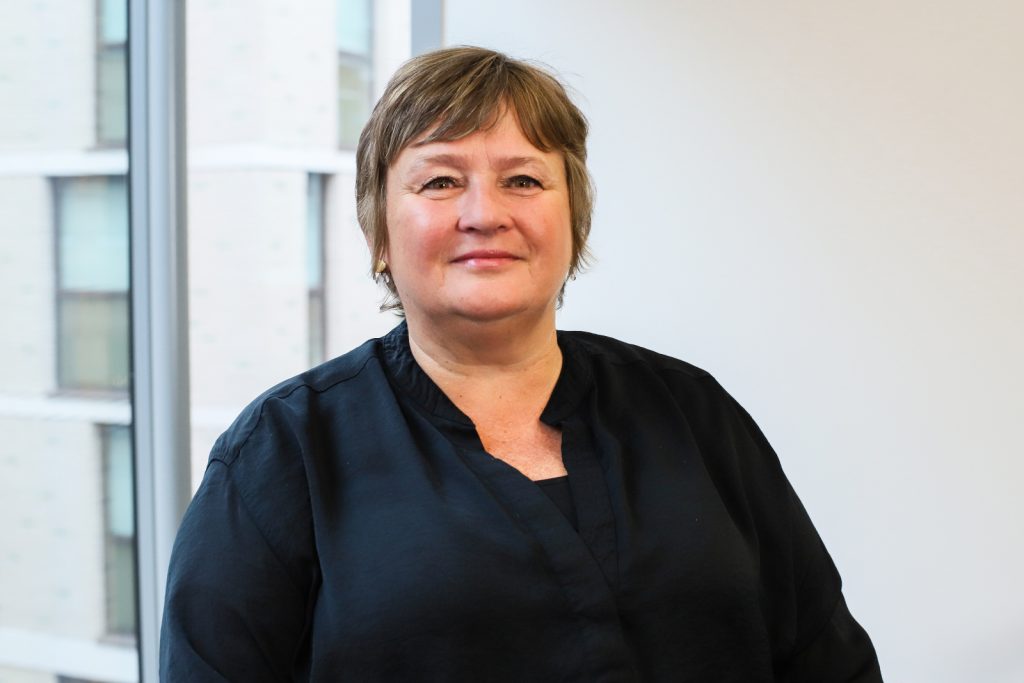The Lawbore Mental Health and Wellbeing interviews: Elizabeth Rimmer
Any profession will have its own trials and tribulations, and the legal profession is certainly no exception, posing its own set of challenges that can cause strain upon the mental health of all those involved. Given the increasing societal awareness and the importance it plays in our day-to-day functioning, maintaining a good wellbeing is key to flourishing not only as a lawyer, but as a human more generally. One way to learn how to keep mentally well is by learning from those who have overcome their own adversities, seeking lessons from the experience of others.
Elizabeth Rimmer has been managing and developing charities in the mental health sector for over 20 years. She joined LawCare in 2014 from the Institute of Group Analysis, a membership and training organisation for group psychotherapists. Before that she headed up Alzheimer’s Disease International, a worldwide federation of Alzheimer Associations. Elizabeth started her working life as a solicitor specialising in clinical negligence, practicing at Leigh Day.

LawCare is an independent charity offering emotional support, information and training to the legal community in the UK and Ireland. They work to promote good mental health and wellbeing in legal workplaces and drive change in education, training and practice. If you need to talk, call them on 0800 279 6888 or visit www.lawcare.org.uk
Has COVID-19 impacted the work at LawCare? How has it affected mental health more generally in the legal profession?
We’ve been busier as an organisation; we’ve had to go through a digital transformation overnight and start doing everything online, and this has actually been good because it was in our strategy for this year to start doing more of this. We’ve had to pivot our resources towards coronavirus, so we created a coronavirus hub on our website and we’re putting up a lot more information related to the issues that are coming up. Our helpline went a bit quiet initially but it’s now picked up again and has become busier. About 40% of the people reaching out to us have a concern related to coronavirus.

What has been interesting is the change we’ve seen. At that time when we went into lockdown on the 23rd, the Government’s advice was everybody needed to work from home wherever possible. We were getting lots of calls from people who were being asked to go into work, even though it was against the guidance. What we’ve seen over time is that now, the number one reason for people reaching out to us is because of any existing mental health problems getting worse. For many people, work, or if you’re at college, at university, you have structure in your day, you have a routine and it helps you manage if you have depression or anxiety.
There’s a lot of informal support that you get through being with other people. If you are at work, say you’re a junior lawyer or a trainee, you can often pop your head round someone’s door and say, “have you got five minutes?” or you’ll have that informal conversation with someone whilst you’re making a cup of tea. If you’ve got a prickly boss, you can pick your moment when you go and speak to them. When you’re not in the workplace, it’s much harder to ask for help in this kind of forum. Also, for a lot of younger people, work is a big part of their social life and structure; they’re going out with people after work for a drink, and so if you’re living on your own and you don’t have other people around you, that can be difficult.

We’re now also getting calls from people who are worried about their future prospects. We’ve had lots of calls from people who have been furloughed, from people worried about whether they will have a job, solicitors being made redundant. We’ve had to be prepared to respond to all the different sorts of scenarios that are cropping up for people but they’re as you would expect.
Do you think COVID-19 will change the mental health support available in the workplace?
There has been significant growing recognition of the importance of mental health in the legal sector and I think coronavirus has helped to amplify that. I’d like to think that the positive is that employers, and hopefully learning institutions as well, are recognising that one size does not fit all. Everybody has their own unique set of circumstances and to support people through this, you really have to listen to what’s going on for them and what their circumstances are. From what I hear anecdotally, people in the workplace have been having much more open conversations.
Prior to coronavirus, the most popular factsheet on our website was about getting a good night’s sleep. Since coronavirus, the number one factsheet downloaded is about how to disclose that you have a mental health concern to your employer. I think that maybe it has taken a lid off, that people have had to talk about it more. So I would like to think that it will lead to a greater recognition of the importance of good support, the importance of really good management and supervision, listening to people, finding out what’s going on, and being flexible around what their needs are. As we move through the pandemic, mental health is being massively impacted for a lot of people. It will be something that organisations will not be able to ignore; they’re going to have to really think about how they support people, especially as it looks like we’re going to be in this blended way of working and studying where it will be online with some face-to-face.
What do you think is the biggest challenge to mental health in the profession?

The biggest challenge in the legal profession is probably still stigma. I think it’s really hard for lawyers and legal professionals to admit that they’re struggling with something, because lawyers have a mindset that everything they do has to be perfect, they don’t make mistakes, they help other people resolve their problems.
It’s really hard to put your hand up and say, “I’m having a tough time” and be open about that. We’re frightened that it may be a career limiting step, or other people will think you’re weak or you’re not good enough, and it’s such a competitive environment that nobody wants to show any chink in their armour.
I think that’s beginning to change, and that might be something that coronavirus is going to help with because people have had to talk about these issues more, and be open and honest with people. We have to tackle stigma, because what stigma does is it silences people, it stops them from talking about how they really feel.
Do you think there’s anything that firms can do to help break down the stigma and make their workplace more mental health friendly?
I think firms can provide education and training to staff. I think most importantly is having internal events where people in the firm speak up about their own experiences. I’ve been to a number of panel events, in quite large London law firms, where they’ve had a partner, somebody from HR, various people from the firm on the panel talking about their own mental health experiences. I’ve heard people share stories about bereavement and suicide in their families. I heard somebody speaking about their son, who had a very difficult time with mental health at university, and the impact that had on him and his wife. You create this safe space for people to talk, and other people in the room really respond to hearing a colleague speak about their own experiences and particularly senior colleagues because we’re so hierarchical in law. We take our cues from how leaders behave, so if you see a senior person speaking about mental health, then that almost gives you permission to speak about it.

That sharing of experiences, and being open and honest helps tackle stigma and pave the way for people to come forward and talk. Before going down the road of ‘we need to do something about mental health and put lots of stuff in place’, we need to have staff forums or surveys to find out what people want to see changed, and get people in all levels of the organisation involved in driving that change.
How did you become the Chief Executive of LawCare?
I did a science degree and nearly decided to become a molecular biologist, but I was always interested in the law and was worked up about by miscarriages of justice in my youth, so I decided to become a lawyer. I did the previous version of the GDL, and I was the last year that did the old Law Society final exams. I became a solicitor and worked at a firm, doing clinical negligence work for claimants. There wasn’t really any support with having to listen to people who had terrible things happen to them, and I felt frustrated that our job was to financially compensate people for what had happened to them – but you can never really financially compensate people where there’s been a catastrophic injury or death. I found it hard to handle the emotional side of that, so I took a year out and did a Masters in medical law and ethics at King’s College London. While I was doing that, a friend of mine’s mum was the chair of an international Alzheimer’s charity, and they needed somebody to help out in the office. I landed up staying there for about ten years and I never went back to law. That’s how I landed up in the voluntary sector, not by design.
I had a baby so I took a few years off, then I went back to work for a small psychotherapy training organisation. I decided it was time to move on from there, because we then left; we were living in London and we moved down to Bath, and I was commuting up to London all the time and I had enough of that.
I was looking for a new job and on the first day, I looked in the Guardian, saw this job at LawCare, and they were looking for someone who’d been a lawyer, had worked in small charities, and knew a bit about mental health, and I thought, “Gosh, that’s got to be me”. I applied for the job and I’ve been here six years.
At LawCare, everybody that works here are people who’ve worked in law, either as lawyers or in other roles, so we get what this environment is like and we understand it. What I learnt was that all of your experiences from different roles can be helpful. I know lots of people plan their careers; I didn’t. It was a set of circumstances that led me down this pathway, and if I’d never landed up working for my friend’s mum, I probably would’ve gone back to law. You just never know how it’s all going to work out.
What has been the biggest change that you’ve seen in your role?
The biggest change I’ve seen is a growing understanding and openness within the legal community to talk about mental health. When I first came here in 2014, we struggled, in terms of being asked to participate in events, speak about mental health and provide information. Now, not a week goes by where we’re not approached to do something. What I’ve seen is this sea change in attitudes and when you look across the legal media, there’s now lots of stuff about mental health that there wasn’t six years ago.
What’s been really great is seeing a lot more senior people speaking about it. We’ve got a Champions Programme in LawCare of people across the profession, quite a lot of them in senior roles but not all of them, who feel really passionate about mental health and want to speak up about it. I feel very optimistic that the winds of change are blowing and they’re getting stronger.
How do you try to maintain good mental health and wellbeing normally?
I set strict boundaries about my work. I go out for a walk with my dog every morning, for at least an hour, I make time to see friends and family, I don’t allow work to overtake my life. I generally feel quite positive and that helps a lot, but I recognise that everybody’s different and have different circumstances.
If you could give one piece of advice to your younger self, what would you say?

Follow your instincts. If you know something isn’t right for you, see what you can do to change it. At LawCare, we get lots of calls from younger lawyers and students who feel pressured to meet the expectations of others, and I think it’s about meeting your own expectations. If you know that the path you’re on is not the right path for you, it takes courage, but seek the path that will make you happy. Life is short but the days are long; think about what really matters for you.
Often, there’s a hidden agenda taught that a successful lawyer works for a large city law firm, but actually, lawyers work in all kinds of sectors. Success isn’t about the status people have from working in different environments, success is about how your work aligns with your values, your purpose, and the things that matter to you. That’s what’s going to make you feel happier and more content, and a better lawyer.

Many thanks to Athena Kam for this interview in the new Mental Health and Wellbeing interview series. Athena is a first year law student at the University of Oxford, with a view of becoming a barrister one day. She is the forthcoming Secretary for the Oxford University Bar Society, having previously held the position of Mooting Officer. She hopes to help push for a more inclusive and mental-health legal profession.
